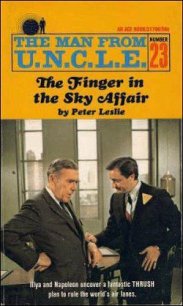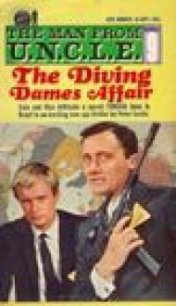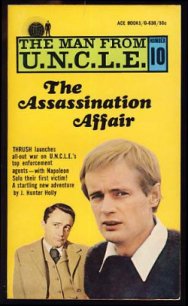The Splintered Sunglasses Affair - Leslie Peter (книги регистрация онлайн бесплатно txt) 📗
Lala was standing at a rosewood table beneath the central chandelier. Beside her, glass in hand, was a wide, bulky man who looked like Orson Welles on an off day. "Mr. Solo!" he exclaimed, moving forward with surprising grace. "One does so apologize for the—ah—unconventional form your invitation took. But it is nice to see you perpendicular at last."
"Let us praise while we can the vertical man," Solo quoted with a crooked smile, "so soon to become the horizontal out..."
"Ah, now—you mustn't feel like that. One admits a certain—ah—theatricality about the means one employed to get you here, about the machinery of seeing that you stay. But then, that's inseparable from having guests who may wish to leave before one is oneself tired of their company, don't you feel?" The voice was firm and yet mellifluous, the perfect complement to the lithe way in which the big man moved.
"The only thing I feel, Mr.... Carlsen?... is curiosity," Solo replied. "Curiosity about the real reason for my presence here. Curiosity about the great pains taken to achieve this—er—visit. Forgive my ignorance and boorishness, but, again... why?"
"We wanted to talk to you, Mr. Solo. That's all. It really is."
The girl was standing beside them. She was wearing a cocktail dress in vivid crimson velvet. From overhead, the light sculptured the soft flesh of her shoulders and hollowed with shadow the slopes of her bosom. "What will you take, Mr, Solo?" she asked. "A dry Martini? Whisky? A vermouth?"
"I'll take a Campari and soda, if you have one," the agent said.
Lala moved across to the wall, dark stockings on her legs gleaming, and tugged at an old fashioned bell-pull. A moment later, a saturnine manservant appeared in the doorway. Behind him, Solo saw the shape of one of the gunmen in the shadows below the staircase.
"Campari and soda for Mr. Solo," the girl said. "And two more whisky sours for Mr. Carlsen and me."
While they waited for dinner, both Carlsen and the girl kept the conversation general. They talked about the New York theatre, about West Coast jazz, about European sports cars, about national rivalries in the Middle East. And as it suited the agent to play a waiting game and see what transpired, and neither of his "hosts" said anything in the slightest degree bearing upon the fact that he was a kidnapped prisoner, the talk remained on this rarefied if artificial level until the manservant reappeared to announce that dinner was served.
Both Carlsen and the girl were well-read and well informed, and such was the quality of their argument and their charm that Solo had constantly to keep reminding himself of his predicament. Even so, he found himself drawn willy-nilly into a spirited defense of the Stanislavsky school of acting and was despite himself enjoying an urbane attempt to demolish Carlsen's theory in favor of Brecht, when the girl took his arm and led the way to the dining room.
Feeling self-conscious and slightly ridiculous, like a man who finds himself on stage during the second act of a drawing-room comedy, Solo moved with her.
The meal was excellent: avocado with a vinaigrette sauce, an exquisite truite aux feuilles vertes served with a delicate Tokay d'Alsace. Tournedos Rossini that melted in the mouth, and a Chambolle Musigny that turned out to be one of the noblest Burgundies that Solo had ever tasted.
He was poring over an unusually wide selection of cheeses offered on a board by the manservant when Carlsen said casually: "I suppose you find in your work, Mr. Solo, that more than half your assignments devolve upon thwarting some villainy or other perpetrated by this Thrush organization. Do you find this involutary—er—specialization makes you stale for any other work you do?"
The agent finished transferring a segment of Chalaronne to his plate on the double prongs of the cheese knife before he replied. Although the question had taken him completely by surprise, his hand neither faltered nor altered the speed of its movements. It was an awkward query, nevertheless; without knowing who or what his captor was, he was unwilling to give it a straight answer, yet he could hardly be so childish as to brush it off with a Secretary of State's "No comment". That would be to impute to himself an importance in the Command which he had no wish to claim... especially now!
In the event, he smiled, looked up at his host, and said mildly, "A trained officer of any kind of enforcement agency—whether it's police, army, intelligence or whatever—learns to regard every assignment as though it were his first. Each one is completely fresh. And I don't know where you get your figures from—but I could hardly confirm your fifty-percent-plus estimate, you know!"
Carlsen was smiling broadly. "Or deny?" he said mischievously.
Solo nodded. "Or deny," he agreed.
"Oh, come now, Mr. Solo! In my business," the other said—as an oil king might say to a movie tycoon—"in my business one is bound to run up against a lot of facts and figures concerning Thrush. Were it otherwise, it would be unnatural... like being in the motor racing game without having heard of Ferrari!"
"And just what is your business, Mr.—er—Carlsen?"
"We are both adults, Mr. Solo. I see no point in elaborate fencing. It bores and disgusts me. And in any case it is obvious that I operate on the wrong side of the law. As to a precise description... what would you say, my dear?"
"I should say that you were in the transport business," Lala Eriksson replied.
Carlsen was delighted. "That's it! That's exactly it," he chuckled. "I am in the transport business... the transportation of items of value, shall we say, from one locality to another!"
"That could cover safe-breaking, bank robbery, kidnapping, espionage, smuggling, drugs or the white slave traffic," Solo said.
"So it could, Mr. Solo. So it could. Do you find that Thrush keep abreast of the remarkable advances in communications we see today? Would you say their telecommunications set-up, for instance, compares with yours, or with that of the United Nations or the MVD?"
The agent spread butter on a Bath Oliver biscuit. "A man of your intelligence can hardly expect a specific answer to that," he said.
Carlsen immediately channelled the subject deftly in another direction. "It's always a moot point, of course," he said, "whether the initial advantage the lawbreaker has... attacker's advantage of surprise... is balanced by the cohesion of the forces arrayed against him. Even if an evil organization like Thrush used satellite techniques for some really grand-scale project, I have a suspicion that the forces of law and order would close ranks so firmly as to make their own systems work better."
"Yes, but you talk of law and order and of evil," the girl interrupted, "as though they were finite qualities and not just subjective labels that people tie on as it suits them "
"I know what you're going to say, Lala," Carlsen in his turn cut in. "And it's perfectly true what Orwell said in that Horizon piece all those years ago Did you ever see it, Mr. Solo? It was called Raffles and Miss Blandish and Orwell pointed out that a thriller in which all the characters were evil was pointless: it lost its punch unless there were also good characters. To be used, you see, as a yardstick against which the bad were measured. Devil worshippers are religious men; they cannot be atheists—because to acknowledge the existence of the Devil automatically implies the existence of a God against whom he works "




